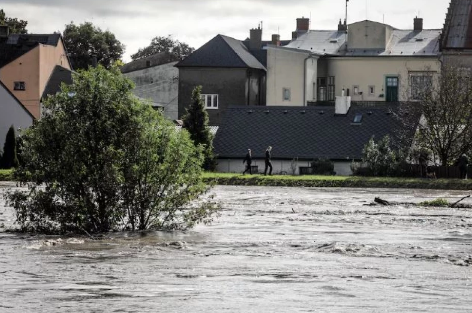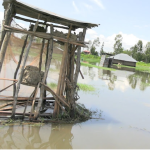The death toll from flooding in central Europe has risen to eight, as thousands of people were evacuated from their homes in the Czech Republic. The flooding, caused by days of torrential rain, has led rivers to overflow in several parts of the region. The low-pressure system named Boris has brought heavy rains from Austria to Romania, resulting in some of the worst flooding in nearly 30 years in areas affected in the Czech Republic and Poland.
More rain and strong winds are expected until at least Monday. Although rain eased on Sunday in Romania, which was heavily hit the day before, the damage has been extensive. Thousands of homes have been damaged, bridges have been swept away, and at least 250,000 households—mainly in the Czech Republic—have suffered power cuts.
On Sunday, one person drowned in southwestern Poland, a firefighter involved in rescue efforts was killed in Austria, and two more lives were lost in Romania. The floods had already claimed four lives in Romania on Saturday. Authorities in Lower Austria, the province surrounding Vienna where the firefighter died, have declared the area a disaster zone and advised against non-essential travel.
In Poland, a bridge collapsed in the historic town of Glucholazy near the Czech border, prompting local officials to order evacuations. Another bridge collapsed in the mountain town of Stronie Slaskie after a dam burst, according to the Polish weather institute. Polish Prime Minister Donald Tusk, who visited the affected areas, announced that the government would declare a state of disaster and seek aid from the European Union.
In the Czech Republic, police are searching for three people whose car plunged into the river Staric near Lipova-lazne on Saturday. Rainfall in the area has reached about 500 mm (19.7 inches) since Wednesday. Reuters footage shows floodwaters gushing through Lipova-lazne and neighboring Jesenik, damaging homes and carrying debris.
Resident Mirek Burianek from Jesenik said, “We don’t know what will be next. The internet network isn’t working, telephones don’t work… We are waiting for who will show up (to help).” Pavel Bily, a Lipova-lazne resident, described the floods as worse than those in 1997, saying, “My house is under water, and I don’t know if I will even return to it.”
Residents in some flooded areas are preparing for worsening conditions. Ferdinand Gampl, an 84-year-old from Visnova, noted, “When it rains (in the nearby mountains), it will arrive here in five or six hours.” Emergency services are using helicopters to evacuate people stranded in the Lipova-lazne district. More than 10,000 people have been evacuated in the Czech Republic, according to the head of the fire service.
In the Hungarian capital, Budapest, officials raised forecasts for the river Danube to rise in the second half of this week to more than 8.5 metres (27.9 feet), nearing a record of 8.91 metres (29.2 feet) in 2013.
As the rain eased in Romania, workers sought to restore power supplies to some 11,000 homes and clean-up efforts started as residents surveyed the damage.
“Everything I have is destroyed,” said Victoria Salceanu in the eastern village of Slobozia Conachi.



